Your goat coughs. Is it a good cough or a bad cough? A normal cough or a begin-to-be-worried-cough? Goat coughing can be normal and it can be a sign of something just not right in your goat. That’s what we are going to be exploring today.
This was a question asked by Josh. He said…
“Hi, I recently purchased the goat binder and am the proud papa of 5 beautiful pretty young goats. Two are still on the bottle. WELL, I think one of my goats may have a cough. I’ve been looking through the binder (I did a search in the online version too) and I found where a cough is listed as a sick symptom but, I can’t find any info on what to do as a pretreatment before I consider a vet visit. She is acting fine, eating and playing with the others. No signs of being sick that I can tell EXCEPT it sounds like she gets something stuck in her throat every now and then almost like a dog or cat sounds like if the have a “fur ball”. We are just past the first month of being together so we are all still learning about each other. Two of my goats still run from me and won’t let me touch them yet. I’m assuming this takes time. Three of them do come to me especially when I’m bringing food. Unfortunately, the one that has the maybe cough is one of the ones that runs from me still. I have caught her and tried to get acquainted but she is still really skittish. I’m letting them take their time getting used to everything. So, is there anything I can do about this cough/fur ball sound? I know your not a vet but i’m looking for advise. Thank you!”
If you like this information, my YouTube channel is full of even more goat information. Please click this link: Delci | A Life of Heritage and subscribe! You can also click this link to watch this information on YouTube: Coughing Goat Information Video on YouTube
Goat Coughing
Why Does My Goat Have a Cough?
Your goat has a cough and you’re worried. I get it. I look at my goats with leary eyes sometimes wondering what’s going to pop up next. What new lesson I’m going to have to learn. I’ve gone through hefty lessons of learning how important minerals are for goats. And how absolutely essential copper is in a herd. And how to work through diagnosing sick goats.
And then they have to cough, which makes you stop and try to decide:
- was that a good cough?
- or a bad cough?
Normal Coughs in Goats: Goat Coughing Up Cud
You see, goats do cough. It’s normal, in fact. Goats chew their cud and to get that cud up, they cough it up! If you see or hear your goat cough and then look over and see them chewing their cud, then that cough was beneficial!
Other Reasons Goats Cough
Dust and Wind and Dusty or Moldy Hay
If your area is having a dusty and windy year or time of year, goats can be affected by that. We can go inside and get out of the wind and dust completely but our goats don’t have that leisure. If you are noticing that your goats are starting to cough and it’s pretty dusty outside, then you can most likely attribute your goat’s cough to it being too dusty.
You may also notice a goat start to cough if you are feeding moldy or dusty hay. You don’t want to feed goats moldy hay ever and if your hay is extremely dusty, consider wetting it down before feeding it to your goats if it seems to be a problem for them.
Allergies
Goats also can have allergy issues, just like us humans can. When there are high pollen counts, this may be causing your goat to cough. So if you’ve ruled out that it’s not pneumonia, lungworms, a cold and your goat doesn’t have a temperature, then it’s most likely allergies.
You can give goats a product like Benedryl to help them with any allergies they have. 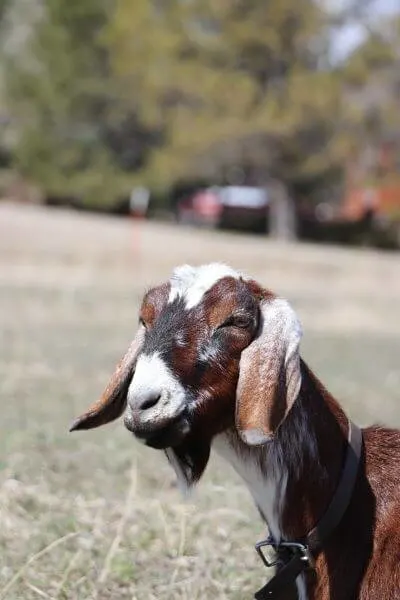
Eating and Drinking Too Fast
The other day at lunch I swallowed wrong and had a coughing fit. Those are so annoying, aren’t they? Like, why did I just choke on that? How silly!
Well, our goats can do the same thing. Simply eating and drinking too fast can cause them to cough.
Sick Coughs in Goat
But if your goat is displaying signs of a cough that also is accompanied by a temperature and a goat acting sick, then you need to pay attention and act quickly.
Signs of Pneumonia and Treating Pneumonia
In truth, goats don’t usually cough with pneumonia. But they can cough with Pasteurella pneumonia abscesses, which is chronic pneumonia that creates abscesses in their lungs and causes them to cough. Believe me, pneumonia in any form is not something that you want to deal with. This article isn’t about pneumonia, I’ve already written about my experience with pneumonia and how to treat it in this article: Pneumonia in Goats and this video: Pneumonia in Goats Video
After reading this, please take some time to learn about pneumonia. It can kill a goat in as little as 4 hours. Overnight. You can put your goats to bed and then wake up to a dead goat. It’s that serious. If your goats are wheezing, or have a raspy sound to their lungs, and they are practicing social distancing and are off by themselves and have a fever, then most likely they have pneumonia.
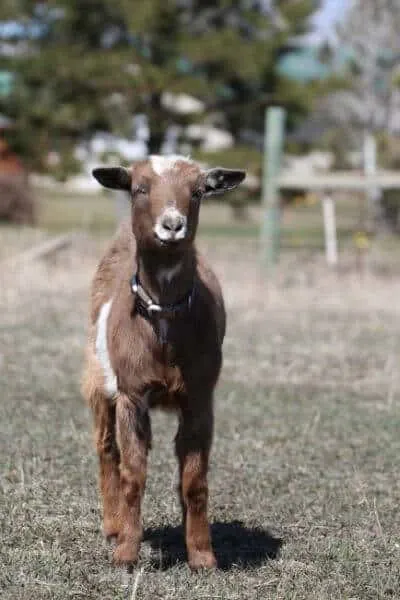 Signs of a Cold in Goats
Signs of a Cold in Goats
If your goat is coughing, doesn’t have a high temperature, but also has clear or white snot then your goat probably has a cold. And you know what? Colds are pretty common in humans, and goats can get them too.
Now, the healthier the human and the healthier the goat, the better that we all can combat the little bugs that come along. But it still can happen. I believe that it’s important to not jump into antibiotics too quickly in the case of a cold in goats. We don’t want to create resistance to antibiotics so that they don’t work when we really need them.
What you can do is support them naturally and help give them more nutrients to help them regain their health quickly.
Give your goat a dose of probiotics, some nutridrench, and giving them some fortified B complex can help boost their system as well. When a goat isn’t feeling well, they may go off feed and they need B vitamins for their rumen to function properly.
Make sure you have their mineral feeders filled with minerals. And keep an eye on them so that you know they are, in fact, getting better. You certainly don’t want their cold to turn into something worse. But you can support your goat’s health to assist them to get better.
Goats Sneezing
Goats are so funny. When my dogs come into the goat pen or something is amiss, I’ll hear my goats sneeze a loud, fervent sneeze. It’s their way of alerting everyone that there is danger lurking. It’s their warning signal.
And little cute playing goats will also sneeze just because they are having fun and talking to each other.
Your goats may also just let out a happy, content sneeze. The more time you spend with your goats, the more you will start to understand and distinguish what the noises your goats make mean.
Now, if your goat is sneezing and it doesn’t seem like anything I just mentioned, then it may be that they are sneezing because of allergies. In some cases, a nose bot fly can cause sneezing in a goat too.
Goat Lungworm Cough
If you find that if your goat is coughing for no reason: they don’t have a temperature, they don’t act sick, they don’t have pneumonia, they cough but don’t start chewing their cud and they don’t seem to have any signs of allergies and there’s no dust in the air, then your goats may have lungworm.
Lungworm infections usually happen when goats are being raised in areas of lots of rainfall and on pastures with standing water.
Many times a goat with lungworms will appear to be healthy. If the worms get too severe, the goat may begin to cough and have trouble breathing, and may have a loss of appetite as well. And because of this, secondary infections can begin in the form of pneumonia and bronchitis.
And to add to the worry, these worms cause scarring in the bronchial and lung tissues, which will affect their lung capacity.
These worms enter the goat either when they are out browsing and eat the forage with larvae on it or they eat a slug or snail. The adult worms then lay eggs in the goat’s lungs or bronchial tissue. They hatch, these are coughed up, swallowed and then are passed out into the poop. The larvae are white and thin and can be as long as 3 inches. The life cycle is 5-10 weeks in length and it remains infective to the goat for at least one year.
The good news is that a healthy goat with a mature immune system can fight off a lungworm infection. But the kids, who are still developing their immune systems, can be hit harder by lungworm infections.
There are a couple of ways to diagnose lungworms. There is something called a Baermann fecal testing but it needs to be done by an experienced operator, it’s easy to do wrong and get incorrect results. And to know absolutely for sure that your goat had lungworms is to do a necropsy. The lungs and bronchial tissues will be examined after the goat has died.
What can you do to prevent your goats from getting lungworms? Well, here are a few suggestions:
- Keep them off of wet, undrained pastures.
- Don’t let them out to graze early in the mornings. This is when slugs and snails are most active.
- Rotate your pastures if at all possible during the year
If you really do feel like your goats have lungworms, then you’ll give 1% Ivermectin orally before the new pasture season arrives and again in the early fall.
What This All Means
If you find your goat coughing, you’ll need to spend a bit more time with them and work through all the symptoms they are displaying and then get to work helping them if they need it.
Document the symptoms you see in your goat binder and also the treatment plan you ended up giving your goat.
In the end, it all comes down to you spending time with your goat and knowing who they are and how they act normally. When you know that then you will know when things are amiss.
Keep those goats healthy and happy and support them when they aren’t feeling well. 🙂
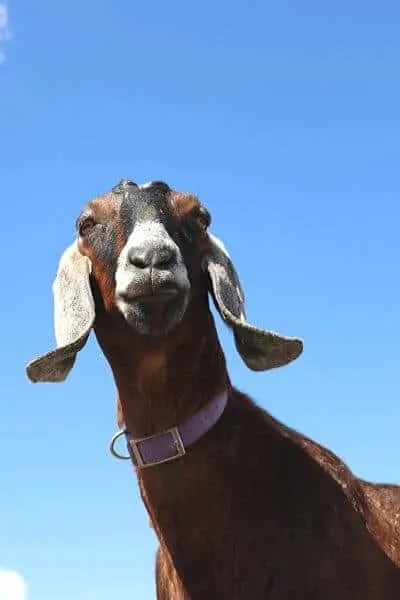
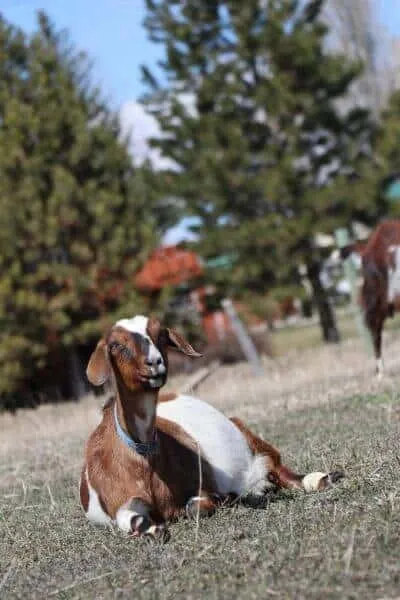
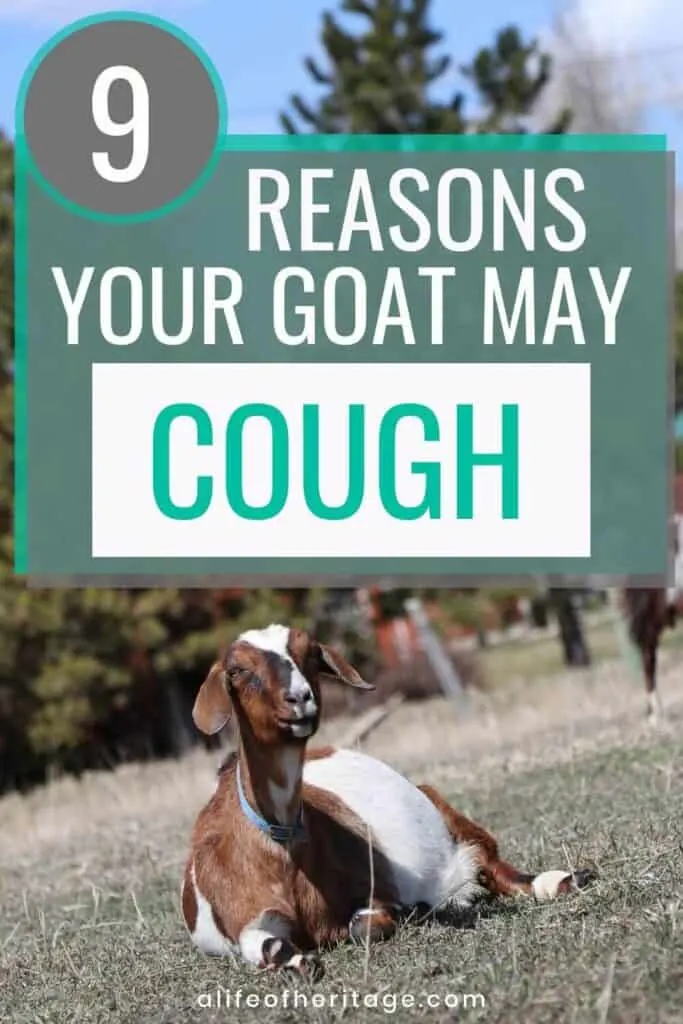
Mark
Tuesday 1st of August 2023
How much of the 1% ivermectin should be given, per pound of goat weight? And just a single dose? Thx.
Delci Plouffe
Wednesday 29th of November 2023
ivermectin 1% is given at 1cc per 20-30 pounds and is given orally to treat worms.
Diana
Thursday 11th of February 2021
Oreo was coughing. I did a search on the question and you answered again! Thank you Delci. She woke me up so I put her up in recliner next to me. I think the cough is her trying to get her rumen started. She grinds her teeth after